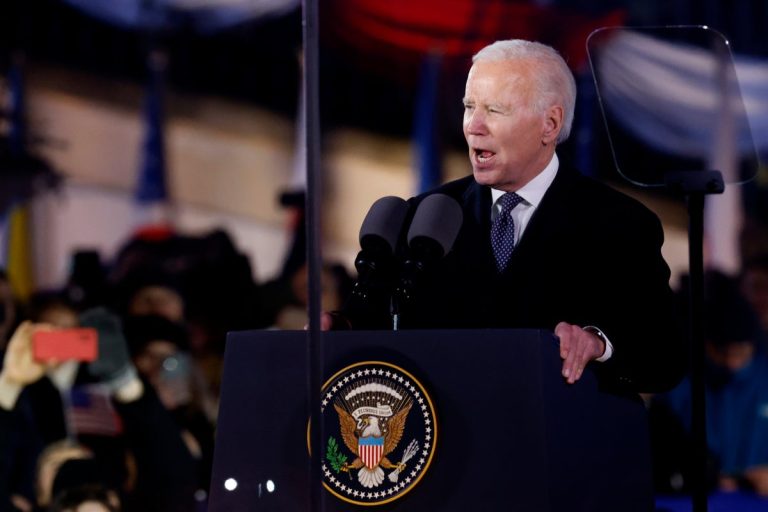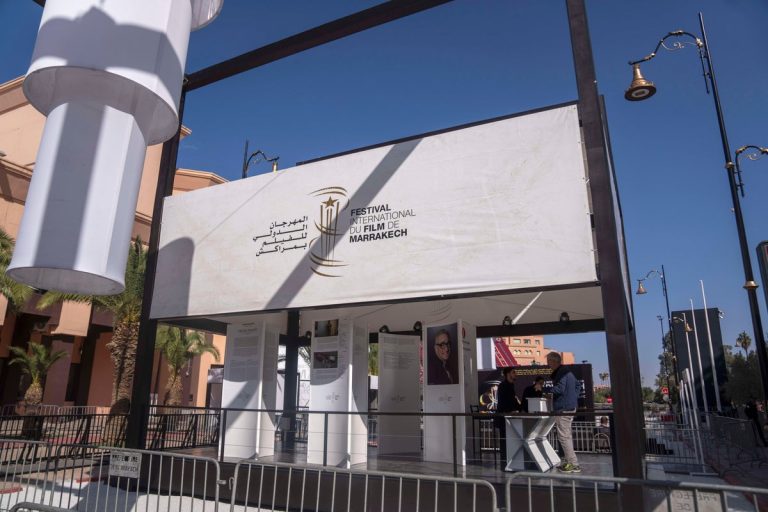Art, law, history and TV: Tusk’s plan to remake Polish life after rightwing rule | Poland

In Poland, there is a changing of the guard, but it’s not happening quickly. The new parliament began work on Monday, but the government-in-waiting, led by the ex-prime minister and former European Council president Donald Tusk, is unable to take office.
The Law and Justice (PiS) party that has ruled the country for the past eight years is now in a parliamentary minority, after elections last month handed victory to a broad opposition alliance. But Poland’s PiS-aligned president, Andrzej Duda, gave the rightwing nationalist party the first shot at forming a new government, even though it clearly does not have the numbers. Barring a political miracle, once two weeks have elapsed, PiS will have failed to form a government and Tusk will get the chance.
In the meantime, with the help of Duda’s delaying tactics, there are signs that the old government is cleaning up after itself: Polish news outlets are reporting a surge in government purchases of shredders.
One of the main challenges for Tusk’s new government will be what Poles have called “de-PiSisation” – restoring neutrality to state bodies. Over the past eight years, PiS has been accused of hijacking institutions, eroding judicial independence, curtailing media freedom and installing cronies in key positions. With Duda in office until 2025, and having the power of veto, reversing all this will not be easy.
The task facing the new government ranges over surprisingly a large area, from Poland’s courthouses to its museums. Here are the key areas of focus.
Television
Public television is perhaps the most visible of all the pro-PiS institutions the new coalition has promised to reform. Under PiS, the state broadcaster, TVP, was showered with funds and its news channel brought firmly under control, spouting full-blown propaganda reminiscent of television in Vladimir Putin’s Russia.
Tusk, on the campaign trail, said he would need just “24 hours” to completely reset public television, though declined to say how. Tadeusz Kowalski, the only member of the five-person broadcasting watchdog who is not loyal to PiS, said there were several ideas for how to do it. However, in an interview before the election, he said it would not be wise to speak about them.
The Polish state broadcaster TVP attracted vocal criticism for its pro-government line during the PiS years. Photograph: Jaap Arriens/NurPhoto/Shutterstock
“It will be very complicated to change the system of public media without legal interference, and legal changes must be approved by the president,” he said. “There are some ideas, but we don’t want to talk about them until they are implemented, to ensure the outgoing government cannot take steps to stymie them.”
Marcin Wolski, a writer and satirist who had a show on public television and spent two years in charge of one of its channels in 2016-17, made waves by saying he was ashamed of the propaganda being broadcast by state television and thought it was worse than in communist times.
He told the Guardian he had made these comments “when emotional”, but said he found the shrill tone of public television to be unpleasant, even if he agreed with its rightwing slant. He said television bosses wanted “less nuance, less intellectual content” from his show.
Wolski said he was sceptical that Tusk’s government would be able to resist the temptation to simply reframe public television as a tool for the new government. “The BBC standard is something to look up to, but I don’t think it’s very likely in practice. It’s in the nature of politicians that they want the media to act as their mouthpiece,” he said.
Judiciary
The erosion of judicial independence and the capture of the constitutional tribunal has been the driver of much of the conflict between the European Union and Warsaw in recent years, and even led to the freezing of some EU funds from Poland.
Tusk has said that bringing back judicial independence at all levels is a key priority, and most pressing is the constitutional tribunal, a body which legal experts say has ceased to function as an independent arbiter after being packed with PiS loyalists. It was a ruling by the constitutional tribunal in 2020 which banned virtually all abortion in Poland.
Legal experts are split on how the new government should tackle the issue of the tribunal, and fierce debates are under way in the coalition camp over how radical the solution should be.
It is expected that, to start with, the new parliament will pass a vote saying it does not recognise the PiS-friendly Julia Przyłębska as the president of the tribunal, that her term has expired and that the process of appointing her was defective in the first place. It will then be up to Duda as to whether he would agree to appoint new judges nominated by parliament.
skip past newsletter promotion
Sign up to This is Europe
The most pressing stories and debates for Europeans – from identity to economics to the environment
„,”newsletterId”:”this-is-europe”,”successDescription”:”The most pressing stories and debates for Europeans – from identity to economics to the environment”}” config=”{„renderingTarget”:”Web”,”darkModeAvailable”:false}”>Privacy Notice: Newsletters may contain info about charities, online ads, and content funded by outside parties. For more information see our Privacy Policy. We use Google reCaptcha to protect our website and the Google Privacy Policy and Terms of Service apply.
after newsletter promotion
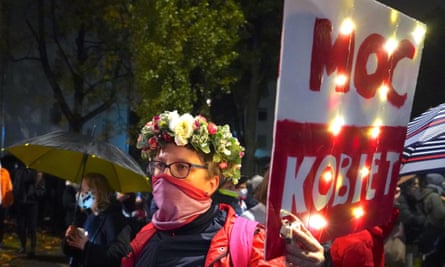 A demonstrator protesting at the introduction of a ban on most forms of abortion by way of a constitutional court ruling in 2020. Photograph: Janek Skarżyński/AFP/Getty Images
A demonstrator protesting at the introduction of a ban on most forms of abortion by way of a constitutional court ruling in 2020. Photograph: Janek Skarżyński/AFP/Getty Images
Cultural institutions
Many state-run museums and galleries have been politicised under PiS, a process that came to a symbolic head in the weeks after the election when it emerged that a PiS-supported artist had won the competition to represent Poland at next year’s Venice Biennale, with a collection of works portraying Poland as a constant victim of German and Russian machinations.
“It was such a sad spectacle,” said Joanna Warsza, a co-curator of Poland’s 2022 pavilion in Venice, who was on the jury for this year’s selection and was one of three members to issue a public letter decrying the decision.
“It was a pure sadness to be in this jury, to see the ongoing takeover of cultural institutions has … reached the pavilion [in Venice],” she said.
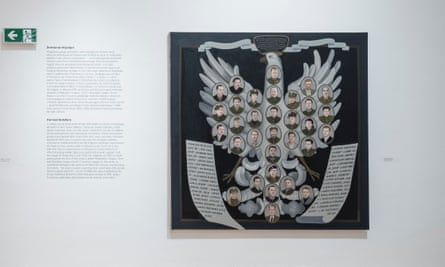 A work by the artist who will represent Poland at next year’s Venice Biennale, Ignacy Czwartos, on show at the Zachęta national art gallery. Photograph: Juliusz Sokołowski
A work by the artist who will represent Poland at next year’s Venice Biennale, Ignacy Czwartos, on show at the Zachęta national art gallery. Photograph: Juliusz Sokołowski
However, she added that the arts was one sphere where it should be fairly simple to restore normality. “It will take some time, but I’m optimistic. The cultural sphere and contemporary art awaits this change and it has to happen,” she said.
National history
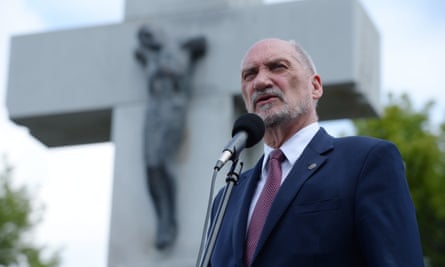 Poland’s then minister of defence, Antoni Macierewicz, speaking in 2017 on a national day of remembrance for the Polish victims of massacres committed by Ukrainian nationalists during the second world war. Photograph: Jacek Turczyk/EPA
Poland’s then minister of defence, Antoni Macierewicz, speaking in 2017 on a national day of remembrance for the Polish victims of massacres committed by Ukrainian nationalists during the second world war. Photograph: Jacek Turczyk/EPA
During the PiS years, the government turned promoting a patriotic vision of Polish history into a key policy area, boosting funding to historical research that sought to portray Polish history as a story of heroic tragedy.
The biggest of these has been the Institute of National Remembrance (IPN), which grew enormously under PiS, publishing hundreds of books a year on Polish history.
“There are almost no historians left at the institute, and some of the people there are even further right than PiS; a number of them have extreme-right connections,” said Adam Leszczyński, a leftwing historian and journalist who has written frequently on the topic of historical memory in Poland. “The consensus of historians is that the institute is compromised beyond repair,” he added.
It is not expected that the new government will close down the IPN, but several smaller organisations may go, and the budget for historical politics is likely to be cut.
“There will be significant cuts in the budget of the IPN, and it will undergo major reforms. There will be no more PiS historical politics,” Michał Szczerba, a member of parliament from Tusk’s Civic Coalition, told the Polish news site Oko Press.




